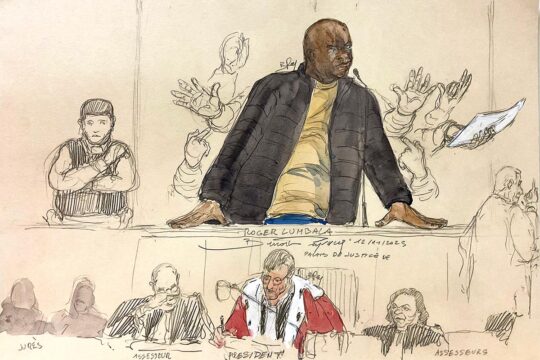DR Congo opposition parties and the government reached agreement Saturday on a deal to defuse a political crisis over President Joseph Kabila's fate that has caused months of deadly unrest, a church mediator and officials said.
Kabila's second and final mandate ended on December 20 with no sign of him stepping down and no election in sight, spurring the church to launch negotiations to avert more violence in Democratic Republic of Congo.
"We have reached agreement on all points," said Marcel Utembi, the bishop who chairs the Episcopal Conference (CENCO) overseeing the talks.
"There will be a plenary session at 8:00 pm (1900 GMT) to formally adopt it and a solemn signing ceremony at 8:30 pm."
Justice Minister Alexis Thambwe Mwamba confirmed a deal had been reached, saying: "Everything is settled."
However a spokesman for Kabila's longtime rival, Etienne Tshisekedi, said negotiators aimed to submit the deal to the 84-year-old opposition leader for approval before returning to sign the accord.
"We want to be absolutely sure" (of Tshisekedi's response), said his advisor Valentin Mubake.
A working document for the deal previously seen by AFP proposed a "political transition" until presidential elections can be held at the end of 2017. A prime minister would come from opposition ranks.
That document also guaranteed Kabila would not seek a third mandate.
In return, the opposition would accept that Kabila remain in office until handing over to an elected successor.
The opposition had previously demanded his immediate departure from public life.
- Objections -
The Catholic Church, which plays a key role in the vast central African country of some 70 million people, launched the negotiations on December 8 and had initially hoped to see a deal before Christmas.
Voters in DR Congo were originally to have chosen a new president this year, but the authorities said the electoral registers must be revised, a huge enterprise in a country almost the size of Europe.
And in a highly controversial ruling, the constitutional court said Kabila could remain in office until an election was held.
The ruling fed opposition fears that he planned to amend the constitution to allow him to run for a third term.
Kabila, 45, has been in power since the 2001 assassination of his father Laurent at the height of the Second Congo War.
He was confirmed as leader in 2006 during the first free elections since independence from Belgium in 1960, and re-elected for a second term in 2011 in a vote marred by allegations of massive fraud.
Sixteen representatives met on Saturday, comprising eight from the opposition coalition, called Rassemblement ("Gathering"), and eight from the government and groups which had signed a deal with the regime in October.
After six hours of talks, new stumbling blocks emerged.
The government side said it wanted the agreement to include giving Kabila the right to call a referendum on constitutional change during the transition period.
The opposition is completely opposed, arguing that Kabila will use this as a device to stay legally in office.
- No democratic transfer -
Another dispute is over wording for the appointment of the prime minister -- the government side want the individual to be "drawn from the opposition," whereas Gathering want the premier to be "appointed by the opposition."
The opposition side also want the deal to allow a wealthy businessman and potential presidential candidate, Moise Katumbi, to be allowed to return to the country.
Katumbi has been sentenced to a three-year term in prison in an alleged case of property fraud and faces another trial in an alleged case of mercenary recruitment.
DR Congo has never witnessed a democratic transfer of power following polls since independence from Belgium in 1960.
Two decades ago, the country collapsed into the deadliest conflict in modern African history.
Its two wars in the late 1990s and early 2000s dragged in at least six African armies and left more than three million dead. Its restive east remains a battleground for rival ethnic militias.



